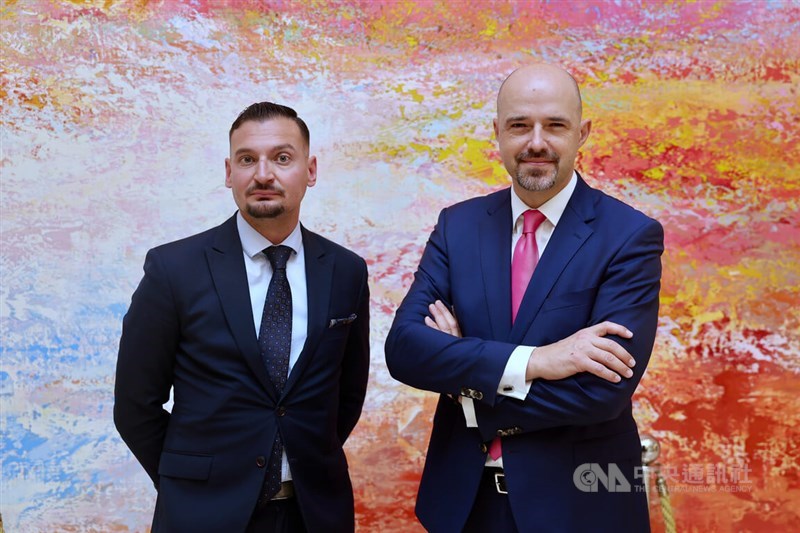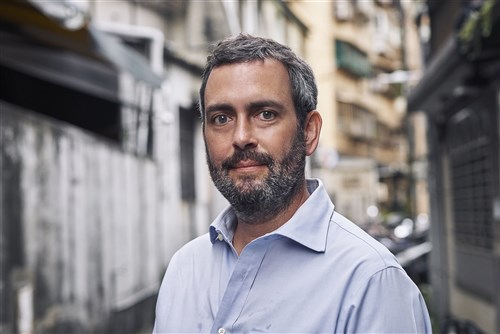
Taipei, May 15 (CNA) Two Polish defense experts said Wednesday that Taiwan should follow Poland's example by significantly increasing its defense budget and investing in affordable military technology such as unmanned aerial vehicles to better prepare for a potential Chinese invasion.
"In Poland, we realized that we need to be less and less dependent on our allies," Tomasz Smura told CNA in an interview on Wednesday.
Although Poland values its strong ties with its main security ally, the United States, it recognizes that Washington is adjusting its global resource allocation following President Donald Trump's return to the White House, he said.
According to Smura, director of research at the Warsaw-based think tank Casimir Pulaski Foundation (CPF), rising threats from Russia make it important for Poland to become more self-reliant in its defense.
Smura, who also heads the foundation's defense program, said Poland's military spending will rise to 4.7 percent of GDP in 2025. He urged Taiwan to follow Poland's example by significantly increasing its defense budget to address a similar threat from the authoritarian regime in China.
Zbigniew Pisarski, president of the CPF, shared a similar view with Smura, citing Cold War-era defense spending that averaged 3 percent of GDP or higher.
"I would heavily recommend that defense spending be much higher in Taiwan," he told CNA.
In 2025, Taiwan's Cabinet earmarked NT$647 billion (US$19.7 billion) for defense spending, equal to 2.45 percent of GDP. Some of this budget was later cut or frozen by the opposition-controlled Legislature earlier this year.
President Lai Ching-te (賴清德) later pledged to propose a special budget to raise defense spending to over 3 percent of GDP, but that plan would also need legislative approval.
Asked what kind of weapon systems Taiwan should invest more in amid rising military threat from China, both members of the CPF have recommended more investments in UAVs, drones, loitering ammunition and anti-ship capabilities.
"Lessons learned from Ukraine show it's not always necessary to spend money on advanced high-end technologies. Sometimes it's better to have large numbers of cheaper equipment," Smura said.
The two CPF members are visiting Taiwan from Monday to Saturday. During their visit, they are meeting with foreign affairs, defense and cross-strait officials, as well as NGOs and think tanks.
Other members of the delegation include Reuben F. Johnson, a research fellow at the CPF, and Aleksandra Trzcinska, director of the CPF's operations department.
The CPF was founded in 2004 and is named after General Casimir Pulaski, a Polish military commander best known for his contributions to the U.S. military during the American Revolution.
The foundation specializes in foreign and security policy and is the chief organizer of the Warsaw Security Forum.
Pisarski told CNA in a Wednesday interview that his foundation traditionally focuses on Europe, transatlantic relations and the former Soviet Union region, but is now expanding its interests to East Asia due to changing international dynamics.
With rising cooperation between authoritarian powers led by Russia and China aiming to undermine the international order and rule-based system, Pisarski said Poland has been doing its best to help Ukraine fight Russia and is now sharing its experience and expertise with Taiwanese counterparts.
!['Ghost Nation': A closer look at Taiwan beyond Beijing's shadow]() 'Ghost Nation': A closer look at Taiwan beyond Beijing's shadow"We've been getting the CCP and the KMT version of Taiwan for forever," veteran American journalist Chris Horton asserts, harboring every intention to reject Beijing's territorial claims over Taiwan.09/05/2025 10:09 AM
'Ghost Nation': A closer look at Taiwan beyond Beijing's shadow"We've been getting the CCP and the KMT version of Taiwan for forever," veteran American journalist Chris Horton asserts, harboring every intention to reject Beijing's territorial claims over Taiwan.09/05/2025 10:09 AM![Protester to soldier: Hongkonger finds road to Taiwan citizenship bumpy]() Protester to soldier: Hongkonger finds road to Taiwan citizenship bumpyIvan Choi (蔡智豪) was forced into exile after playing an active role on the front lines of Hong Kong's 2019 mass protests.08/22/2025 04:27 PM
Protester to soldier: Hongkonger finds road to Taiwan citizenship bumpyIvan Choi (蔡智豪) was forced into exile after playing an active role on the front lines of Hong Kong's 2019 mass protests.08/22/2025 04:27 PM![Taiwanese American puts groovy spins on classic Hokkien songs]() Taiwanese American puts groovy spins on classic Hokkien songsTo Shinyi Lee (李欣怡), Hokkien Taiwanese music needed an overhaul. Seeing the genre as dominated by "khàu-tiāu-á" (哭調仔, "crying songs") and lacking grooves, she set out to change it by putting her own spin on traditional Taiwanese songs.08/18/2025 07:47 PM
Taiwanese American puts groovy spins on classic Hokkien songsTo Shinyi Lee (李欣怡), Hokkien Taiwanese music needed an overhaul. Seeing the genre as dominated by "khàu-tiāu-á" (哭調仔, "crying songs") and lacking grooves, she set out to change it by putting her own spin on traditional Taiwanese songs.08/18/2025 07:47 PM
- Business
August CPI below 2%, but low-income still pressured
09/07/2025 09:09 PM - Sports
All-time CPBL home run leader Ngayaw‧Ake' ends career with 305th homer
09/07/2025 08:38 PM - Society
Tropical Storm Tapah disrupts flights between Taiwan, HK, Macau
09/07/2025 08:19 PM - Culture
Taiwanese cinema in spotlight at Vancouver film festival
09/07/2025 07:28 PM - Society
Lunar eclipse to occur late Sunday to early Monday
09/07/2025 06:52 PM


